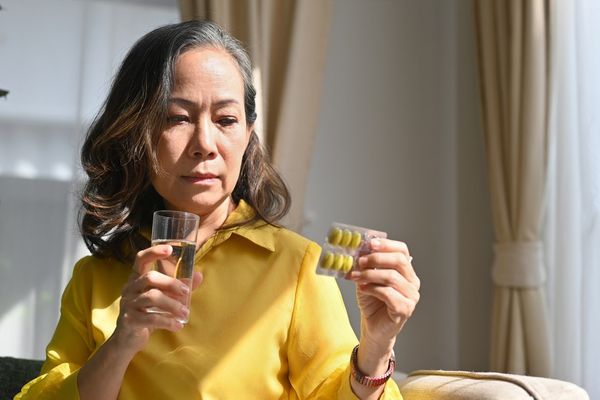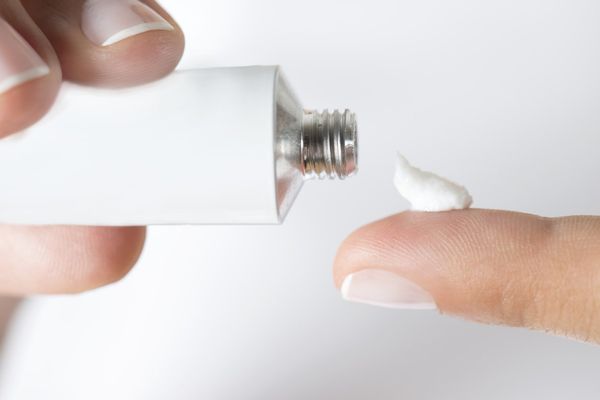Shannon Lee isn't interested in complaining about perimenopause — even when her symptoms, such as fatigue and cycle uncertainty, are bothersome. She entered perimenopause early, at 41, and is looking forward to the next phase of her life, without her period.
Lee, now 43, credits much of this acceptance to her mother, who also went through menopause early and discussed it openly with her. "I'm thankful I have a mom who has always been forthright with me and is comfortable talking to me about all things medical," Lee said over email.
Aside from her mother (and a supportive OB-GYN and primary care provider), Lee hasn't sought out additional support, because she fears it wouldn't be worthwhile in a culture that avoids discussing issues like menopause.
"I feel we as Americans avoid certain topics that other cultures regularly discuss and integrate into their education and daily conversation. Death, sex, and [conversations about] our bodies and what happens to them, are avoided," Lee said. "Meanwhile, other cultures regularly integrate discussion of those things into their daily lives ... We avoid it at all costs, it seems."
Why we don’t talk about menopause
Approximately half of Americans will go through menopause. Yet it remains underdiscussed, leaving many women scared about the changes they're experiencing and in the dark regarding perimenopause, vasomotor symptoms such as hot flashes and night sweats, and hormone therapy.
"We get the 'talk' when we're about to start our periods," said Dr. Stephanie Faubion, director of the Mayo Clinic Center for Women's Health and medical director of The North American Menopause Society. "Nobody gets the 'talk' when you're about to stop your period."
Dr. Mary Jane Minkin, a clinical professor at Yale University School of Medicine's Department of Obstetrics, Gynecology and Reproductive Sciences and member of HealthyWomen's Women's Health Advisory Council, agreed that menopause isn't discussed — to the detriment of those who experience it. "People shouldn't get hot flashes and not know what's going on," Minkin said. But it happens.
Though it's changing, the taboo surrounding menopause remains — partly because it's interconnected to equally stigmatized topics: age and sex. Rarely is sex openly discussed (take abistence-only sex education for instance) and Minkin noted that, when it is discussed, only the titillating aspects of sex are focused on, while the biological or functional parts are ignored.
Meanwhile, our youth-glorifying culture especially targets women. A 2018 study on opposite-sex online dating found that women's desirability peaks at 18, while men's desirability peaks around 50. As such, women are encouraged to hide their age by any means available (hair dye, plastic surgery, beauty products, etc.), which extends to demonizing menopause.
"We go through menopause as we get older. That's a fact," Minkin said. "And in this country, we're not supposed to get old because getting old is a bad thing."
But the hush-hush surrounding menopause is also connected to the medical community's lack of understanding. As of 2011, only 20.8% of OB-GYN residency programs had formal menopause curriculums, and that doesn't seem to be improving. Minkin also blamed the reduction in medical residency hours, which leaves less time for students to learn about menopause care. She concluded, "Menopause education has gone by the by in the United States."
Likewise, Faubion noted that menopause is rarely asked about or documented by healthcare providers, which can leave women dumbfounded by their symptoms. Some patients, she said, visit the Mayo Clinic thinking they're dying. "I've seen it again and again. It's just upsetting because some education in advance would have eliminated the anxiety," Faubion said.
A similar taboo continues to stigmatize menstruation. According to a 2020 study, more than half of women and men find periods embarrassing to discuss. But across the United States and abroad, the next generation of women are empowering those who menstruate to talk about their periods in an effort to improve health and wellness.
Change is happening
As Generation Z is changing the conversation around periods, a new generation of women entering midlife are doing the same for menopause. "It's not the baby boomers anymore," Faubion said. "Gen X women want to experience menopause in a different way. They don't want to be defined by their reproductive status."
After years of feeling invisible, many midlife women are now refusing to move into the shadows. Faubion said, "I think they will help us change the conversation."
Dedicated healthcare providers are also working to change the narrative and get women talking. Last spring, Minkin and Pfizer launched menopause: unmuted, a podcast featuring women who share their menopause stories. As host, Minkin debunks myths and provides expert insight. The goal is to raise awareness and encourage communication and information sharing.
Faubion is interested in another approach: Proving menopause is a medical priority by educating providers of the link between menopause, hot flashes and cardiovascular risk. A handful of studies have been conducted over the last decade to better understand the correlation. "I think that will help us drive educating providers a little bit more," Faubion said. "If we say no, it's not just a nuisance, it's a risk factor for heart disease."
Others are spearheading efforts to bring conversations about menopause to the workplace. Last February, Jeneva Patterson, argued in the Harvard Business Review that it's time to start talking about menopause at work because the timing often aligns with women being promoted to leadership positions.
Talking about menopause won't remove the taboo overnight, but it's a great starting point. (Former First Lady Michelle Obama agrees.)
"If women can communicate with each other about what they're going through, then they're not alone," Minkin said. Not feeling alone creates a better mindset about menopause, and studies show a more positive outlook can even lead to reduced symptoms.
Lee, who's thankful her mother openly discussed menopause, agrees. "We need to talk about it more [to] prepare women — and men — to be supportive of family, friends, loved ones."
- How to Have the Best Sex of Your Life After Menopause ... ›
- 10 Things the Men in Your Life Need to Know About Menopause - HealthyWomen ›
- How to Have the Best Sex of Your Life After Menopause - HealthyWomen ›
- From Hot Flashes to Night Sweats, a Rundown of Vasomotor Symptoms During Menopause - HealthyWomen ›
- Support for Menopause in the Workplace - HealthyWomen ›
- 5 Easy Ways to Bust Menopause Fatigue - HealthyWomen ›
- COPD and Menopause - HealthyWomen ›
- I Kept My Menopause Symptoms a Secret - HealthyWomen ›
- Perimenopause & Menopause at Work - HealthyWomen ›







